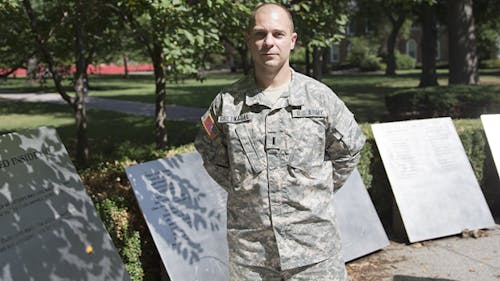Marine’s story inspires veteran to rejoin Army

Frank Greenagel is not particularly fond of guns. In his eight years in the United States Army, he was not very fond of shaving or shining his boots either. But Greenagel has decided to go back to a culture that never made him feel quite at home.
“Who I went in at 19 was very different than who I was when I got out at 25. So I’m glad I did it, but at the same time, it wasn’t a culture I was entirely comfortable with,” he said.
After serving as a tanker in Ft. Knox, Kentucky, and in the New Jersey National Guard, Greenagel’s active time ended in 2002. He was honorably discharged in 2004, but the U.S. Army is not the only major part of his past. Greenagel has a long-standing relationship with Rutgers as well.
While in N.J. National Guard, he acquired a bachelor’s degree in English and history from Rutgers. After being discharged and teaching in Japan for a year, Greenagel returned to Rutgers for a master’s in social work.
Since 2009, he has worked as a therapist at Rutgers Counseling, Alcohol (and Other Drug Assistance Program) & Psychiatric Services in addition to overseeing Rutgers Recovery Housing to work with veterans who seek help.
Greenagel, currently a professor in the School of Social Work, is also the executive director of College Recovery, which is a mile away from campus and provides students with treatment for significant alcohol and drug abuse, mental health and eating disorders.
Though Greeangel had long been discharged in October 2013, the military made an impromptu reentrance into his life when a Marine veteran walked into his office.
The veteran, who chose to remain anonymous, was in recovery when the Rutgers Veterans House referred him to Greenagel. It was soon thereafter that Greenagel was introduced to the demons the Marine had been living with.
Between 1999 and 2001, the anonymous veteran was stationed in Afghanistan, where his unit had to be operational 24/7.
During his tour, he spent nine days patrolling ships and moving the bodies of dead sailors from the ships to the shore.
The agonizing nature of his mission led him to experience severe post-traumatic stress disorder. He experienced pain from his injuries and sleepless nights, for which he was prescribed drugs that did little to ease the pain.
After the military’s failure to provide the veteran the treatment he needed, he turned to alcohol. Greenagel said the combination of the alcohol and the drugs bred an addiction for which the Marine vet immediately received a dishonorable discharge.
After being discharged, the veteran became addicted to heroin and plummeted into an abyss of depression, severe addiction and nearly suicide before he decided to take the road to recovery, he said.
“I tried to kill myself, and I woke up in the hospital and that moment, I decided to do something different,” the anonymous veteran said.
Although it took the former veteran more than six years to pull himself out of the grips of addiction, it left a mark on his life that evokes deep regret and dismay.
“I [used to] think I was a failure,” the source said. “I asked for help and they told me to man up, and that built a path for self-destruction.”
He decided to attend Rutgers soon after, but did not want to live with college students due to his fear of relapsing. At this time, the source met Greenagel, who immediately invited him to move in to Rutgers Recovery Housing.
“Frank has done a great deal with my struggles ... and my recovery,” he said. “He has been a good friend and a mentor.”
The Marine’s story laid the blueprints for Greenagel to provide his experience in counseling to veterans. However, what strengthened his confidence was finding out that his experience is a fairly common one among veterans.
The source said a few people he served with committed suicide after being discharged under similar conditions, and a few died of overdoses.
Capt. Gabriel Tese, an Army lawyer currently serving at Ft. Hood, Texas, echoed a similar sentiment.
From his experience, Tese said he has witnessed substance abuse, depression, PTSD and other issues in soldiers. The standard procedure is sending the soldiers to a rehabilitation program, which allows them to serve as long as they finish the program.
However, if they relapse, their job responsibility is degraded, and they cannot continue to serve in the same manner.
Greenagel argued that the problem exists with the way treatment is carried out within the Army, and that is what he aims to change.
In the days that followed Greenagel’s encounter with the Marine, he called some Army bases and offered his services as a national expert on addiction and recovery issues. However, he was told the military almost never hired external trainers.
His countless efforts finally got him in touch with an active duty colonel, who informed him that if he rejoined the Army, he could provide his services as a Behavioral Sciences Officer to help veterans with substance abuse and PTSD, as well as help veterans go back to school.
On Aug. 29, Capt. Tese swore Greenagel back into the army at the World War II memorial at Rutgers. Although he was initially reluctant to rejoin the Army, the fact that he is going back with “a lot more power and a lot less grief” makes him comfortable.



